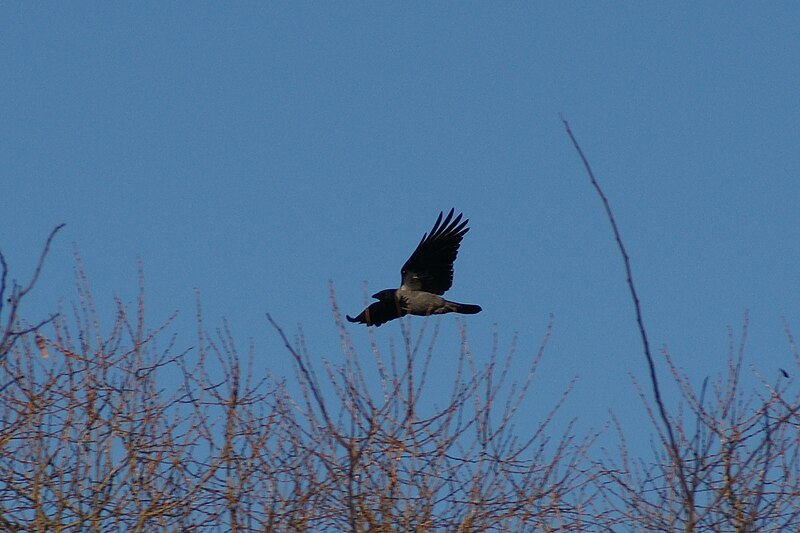.

Gilbert White watched the skies
for signs
marking the seasons
passing. The first sighting
in February
or March
on the downs
of the hooded crow,
Corvus corone corvix,
flying over
toward the north,
meant spring
could no
longer be so
far away. All knowledge
local
and precise. Riding out
on the downs
February
16, 1770
from Fyfield, White
notes Grey crows are not seen
until we come
to about Andover
from the eastward. As you go
thence westward into
Wilts they abound.
And then again, as the year
turns -- the first snow
fall in Norway, sensed
at this distance
as a crispness
in the air
of the village -- the hooded
crow heading south
over the chalk scarp
toward the coast:
the seasonal clock
self-rewinding.
October 29 -- November
7, 1776. Grey
crows return -- these are winter
birds of passage, & are never seen
with us
in the summer.
The years
go past, in one
place, blending
together: a dense beech-
wood hop-picking black
malm-founded house-
martin-flocked
calendar. Timothy
the tortoise, with a page
or two of Horace
by candle light.
September 11, 1791.
Grey crow returns, & is seen near
Andover. Red even,
sweet moon.
The notation spilling
over the prim
ruled margins
of the ledger, bursting
beyond
the columnar
limit, flooding
the careful compartments
and containments
to capture
an unruly
abundance.
for signs
marking the seasons
passing. The first sighting
in February
or March
on the downs
of the hooded crow,
Corvus corone corvix,
flying over
toward the north,
meant spring
could no
longer be so
far away. All knowledge
local
and precise. Riding out
on the downs
February
16, 1770
from Fyfield, White
notes Grey crows are not seen
until we come
to about Andover
from the eastward. As you go
thence westward into
Wilts they abound.
And then again, as the year
turns -- the first snow
fall in Norway, sensed
at this distance
as a crispness
in the air
of the village -- the hooded
crow heading south
over the chalk scarp
toward the coast:
the seasonal clock
self-rewinding.
October 29 -- November
7, 1776. Grey
crows return -- these are winter
birds of passage, & are never seen
with us
in the summer.
The years
go past, in one
place, blending
together: a dense beech-
wood hop-picking black
malm-founded house-
martin-flocked
calendar. Timothy
the tortoise, with a page
or two of Horace
by candle light.
September 11, 1791.
Grey crow returns, & is seen near
Andover. Red even,
sweet moon.
The notation spilling
over the prim
ruled margins
of the ledger, bursting
beyond
the columnar
limit, flooding
the careful compartments
and containments
to capture
an unruly
abundance.

Italicized passages from Gilbert White: Journals, ed. Walter Johnson, 1931
Hooded crow (Corvus corone corvix) in flight: photo by Leviathan, 2009
Hooded crow (Corvus corone corvix): photo by M. Betley, 2004



4 comments:
very beautiful, thanks -- to TC and GW
Thanks Steve.
Ah, White's Naturalist's Journal: total sublimity. Perfect observation, loving attention to detail, touch, tact, pitch, all the pertinent facts about everything that matters, all given in that same quiet, steady, unforced notational private voice.
His Natural History of Selborne is very fine as well. But that is a bit more formal because in it he generally has an "audience" of at least one person other than himself.
(My favourite writer, this morning.)
hey Tom... you can always turn some facts into great works of poetry... this one was so rich...
did you know that the crows we have in Tehran are hooded crows? exactly like this one... lot of them in the neighborhood i live... i love them so much... put some food for them and other birds on the rooftop...
they don't go to return... they have adapted themselves to this big noisy and polluted city...and feed on the garbage... and the sad part is that many people hate them... they say crows bring bad omen... but they have brought me nothing but beauty... and joy...
thanks my friend...
Many thanks again, hb.
Silly superstitions regarding animals merely prove once again (as if it needed proving) how much more intelligent they are than humans.
The only place where omens possess any reality is inside that sad prison, the human mind.
Post a Comment